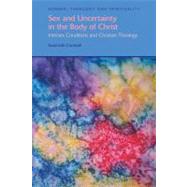Sex and Uncertainty in the Body of Christ: Intersex Conditions and Christian Theology
, by Cornwall,Susannah- ISBN: 9781845536695 | 184553669X
- Cover: Nonspecific Binding
- Copyright: 8/21/2014
The book provides the first full-length examination of the theological implications of physical intersex conditions and their medical treatment. Mainstream Christian theology has valued the integrity of the body and the goodness of God reflected in creation, but has also set much store by the complementarity of normal male and female physiology. However, a deconstruction of male and female as essential or all-embracing human categories changes conceptions of legitimate bodiliness and of what it means for human sex to reflect God. Theologies which value incarnation and bodiliness must speak with stigmatized or marginal bodies too: the Body of Christ is comprised of human members, and each member thereby changes the Bodys definition of itself. Accepting the non-pathology of intersexed and otherwise atypical bodies necessitates a re-examination of discourses about sex, marriage, sexuality, perfection, healing and the resurrection body. Informed by existing theologies from three marginal areas (transsexualism, disability and queer theology), this beginning of a theology from intersex demonstrates the necessity of resisting erotic domination in defining bodies. It provides a robustly theological perspective on a topic which has become increasingly examined within sociological and critical discourse.In a book that radically challenges conventional understandings of the dynamics of cultural imperialism, Shaden M. Tageldin unravels the complex relationship between translation and seduction in the colonial context. She examines the afterlives of two occupations of Egypt--by the French in 1798 and by the British in 1882--in a rich comparative analysis of acts, fictions, and theories that translated the European into the Egyptian, the Arab, or the Muslim. Tageldin finds that the encounter with European Orientalism often invited colonized Egyptians to imagine themselves "equal" to or even "masters" of their colonizers, and thus, paradoxically, to translate themselves toward--virtually into--the European. Moving beyond the domination/resistance binary that continues to govern understandings of colonial history, Tageldin redefines cultural imperialism as a politics of translational seduction, a politics that lures the colonized to seek power through empire rather than against it, thereby repressing its inherent inequalities. She considers, among others, the interplays of Napoleon and Hasan al-'Attar; Rifa'a al-Tahtawi, Silvestre de Sacy, and Joseph Agoub; Cromer, 'Ali Mubarak, Muhammad al-Siba'i, and Thomas Carlyle; Ibrahim 'Abd al-Qadir al-Mazini, Muhammad Husayn Haykal, and Ahmad Hasan al-Zayyat; and Salama Musa, G. Elliot Smith, Naguib Mahfouz, and Lawrence Durrell. In conversation with new work on translation, comparative literature, imperialism, and nationalism, Tageldin engages postcolonial and poststructuralist theorists from Frantz Fanon, Edward Said, and Gayatri Spivak to Jean Baudrillard, Walter Benjamin, Emile Benveniste, and Jacques Derrida.







